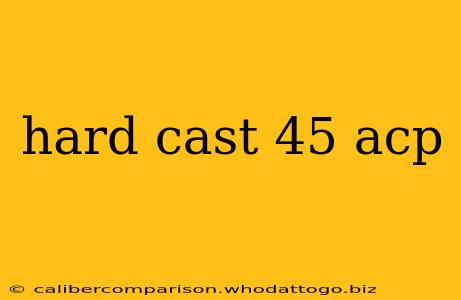The .45 ACP cartridge, a venerable round with a storied history, enjoys a dedicated following among shooters, reloaders, and enthusiasts. Within this community, a significant debate often centers around bullet choice, with hard cast bullets frequently taking center stage. This comprehensive guide delves into the specifics of hard cast .45 ACP bullets, exploring their construction, performance characteristics, and ideal applications.
Understanding Hard Cast Bullet Construction
Hard cast bullets distinguish themselves from other bullet types through their manufacturing process. Instead of using jacketed lead cores, hard cast bullets are made from a single alloy, typically lead with the addition of other metals like tin, antimony, or other alloying agents. This alloy is carefully chosen to enhance hardness and durability, allowing it to withstand the pressures of firing and maintain its integrity upon impact.
The higher hardness is achieved through a process that involves careful control of the alloy composition and the casting process itself. This results in a bullet that is significantly harder than a typical lead bullet, offering improved resistance to deformation during firing and better penetration.
Advantages of Hard Cast .45 ACP Bullets:
- Increased Durability: Their higher hardness translates to superior resistance to deformation, reducing leading in the barrel. This is particularly beneficial for revolvers, which often experience more fouling than semi-automatic pistols.
- Superior Penetration: Hard cast bullets tend to penetrate deeper than jacketed or softer lead bullets, making them a favored choice for hunting and self-defense scenarios where deep penetration is crucial.
- Cost-Effective: Generally, hard cast bullets are less expensive than jacketed bullets, making them an attractive option for high-volume shooters and reloaders.
- Accuracy Potential: While some shooters assume otherwise, carefully made hard cast bullets can achieve high accuracy levels, especially when properly sized and lubricated.
Disadvantages of Hard Cast .45 ACP Bullets:
- Potential for Leading: While the higher hardness reduces leading compared to softer lead bullets, it's not entirely eliminated. Regular cleaning is still essential, especially with longer shooting sessions.
- Higher Recoil: The increased weight of some hard cast bullets can result in a slightly higher felt recoil.
- Barrel Wear: While not always significant, the harder alloy can contribute to slightly increased barrel wear over time compared to jacketed bullets. This is often dependent on the hardness of the alloy and the specific gun.
- Availability: Compared to jacketed rounds, the availability of specific hard cast bullet weights and designs might be more limited.
Performance Characteristics and Applications
Hard cast .45 ACP bullets exhibit unique performance characteristics, making them suitable for specific applications:
- Hunting: Their deep penetration makes them effective for hunting medium-sized game at close ranges. However, they may not be the best option for thin-skinned game.
- Self-Defense: The significant penetration, while beneficial in certain scenarios, also raises some concerns regarding overpenetration. This necessitates careful consideration of the environment and the potential for collateral damage.
- Target Shooting: While their higher recoil might not make them ideal for high-volume target practice, many shooters successfully use hard cast bullets in target shooting with good results.
- Revolvers: Their durability and resistance to deformation make them particularly well-suited for revolvers, where barrel leading can be a significant issue.
Choosing the Right Hard Cast .45 ACP Bullet
Selecting the appropriate hard cast .45 ACP bullet requires careful consideration of several factors:
- Bullet Weight: Heavier bullets generally deliver more energy and penetration, but also higher recoil.
- Bullet Shape: Different shapes (round nose, flat nose, wadcutter, etc.) impact accuracy and penetration.
- Alloy Composition: The specific alloy used influences hardness, penetration, and leading characteristics.
- Lubrication: Proper lubrication is critical to reduce friction and leading.
Ultimately, the optimal hard cast .45 ACP bullet depends on the intended application and the shooter's preferences. Experimentation and careful consideration of the bullet's characteristics are key to finding the perfect match for your firearm and shooting style. Consult with experienced reloaders or firearms experts to gain additional insight.

